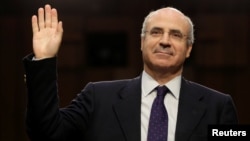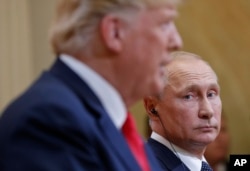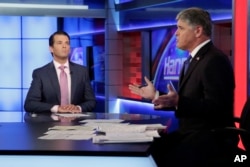None of the questions posed to President Donald Trump and Russian President Vladimir Putin after their one-on-one meeting in Helsinki mentioned U.S.-born British financier Bill Browder, but Putin singled him out anyway.
The Russian leader suggested he would grant special counsel Robert Mueller access to the 12 Russians indicted for meddling in the 2016 U.S. election if Russian investigators could interrogate foreign tax cheats.
"For instance ... business associates of Mr. Browder have earned over $1.5 billion in Russia, [who] never paid any taxes, neither in Russia nor in the United States, and yet the money escaped the country," said Putin, reiterating well-worn allegations that have long since been debunked as unfounded.
Browder, chief executive officer of Hermitage Capital, has been the driving force behind the Magnitsky Act, a 2012 U.S. law authorizing sanctions against human rights abusers in Russia that freezes their assets and bans their entry to the U.S.
Named after Browder's lawyer, Sergei Magnitsky, who died amid allegations of beatings and medical neglect in a Russian jail after working to expose a purported tax fraud scheme by Russian officials, the U.S. legislation — which has since been adopted in seven other countries — may be the single largest threat to the Russian leader's massive personal fortune.
Effort to detain
The Russian government, which has long denied the fraud charges and officially blamed Magnitsky's death on a heart attack, has continued to pursue Browder, and in May asked Spanish police to detain him on what turned out to be an expired Interpol warrant.
Within hours of the Trump-Putin meeting, the Prosecutor General of Russia announced that it had prepared an official request to cross-examine a number of U.S. officials and intelligence agents, including former U.S. ambassador to Russia Michael McFaul, as part of its criminal proceedings against Browder.
That the Russian leader again mentioned him by name at a high-profile public forum, Browder told VOA's Russian service, only proves Western sanctions are being felt in Moscow.
"I think Putin is taking it personally because of all the success that I have had in getting the Magnitsky Act passed all over the world," Browder said. "He's made no secret of the fact that Magnitsky Act is his single largest foreign policy priority to repeal. He's obviously very rattled and upset by all the different people who have been sanctioned under Magnitsky and other related sanctions programs, and this is his Achilles' heel."
A primary reason why Putin hates the Magnitsky Act, Browder has told VOA in prior interviews, is that he asks people around him to commit very grave crimes on his behalf, such as illicitly commandeering private assets and property.
"In order to get people to do these terrible acts, he has to guarantee these people impunity," Browder said. "He could do that in the past. But now, because of the Magnitsky Act, there are consequences outside of Russia that he has no control over. This [lack of guaranteed impunity] challenges the entire operation of his regime."
The Kremlin typically declines to respond to these allegations, but in 2013, a Moscow court tried and sentenced Browder in absentia on tax evasion charges, accusing him of failing to pay $16 million in taxes. Magnitsky himself was posthumously convicted in that same ruling.
In 2016, Browder said, a group led by Kremlin-linked attorney Natalia Veselnitskaya "went around and tried every different document, every different door to find sympathetic ears to repeal the Magnitsky Act."
Trump Tower meeting
"The meeting with [Donald] Trump Jr. was just one of the meetings they had," he said, referring to the 2016 meeting at Trump Tower that also was attended by, among others, White House adviser Jared Kushner and then-campaign manager Paul Manafort.
"They had meetings all up and down Capitol Hill with members of Congress trying to do the same thing," he said. "In my opinion it was a completely failed operation, but it does not mean they didn't have a lot of resources to try to make it happen."
In a July 2017 interview with Fox News' Sean Hannity, Trump Jr. described being disappointed when Veselnitskaya changed the subject of the meeting from information damaging to Democratic candidate Hillary Clinton to Russian adoption policy.
"That's when we shut it down," Trump Jr. said, wondering "… what does this have to do with what we were talking about?"
Russia's ban on adoptions by American families, colloquially referred to as Moscow's "anti-Magnitsky Act," was advanced by Putin's United Russia party nine days after former President Barack Obama signed the Magnitsky Act into law.
President Trump has defended his 40-year-old son's actions, downplaying the meeting with Kremlin operatives as a normal part of campaign trail "opposition research."
In excerpts of an interview with Kremlin-funded RT news, Veselnitskaya defended the meeting at Trump Tower, contending she was the victim of a "disinformation" campaign organized by Browder.
Browder has said he had no knowledge of the meeting until it was reported by various news media outlets, and the public may never know precisely what was discussed that day.
'Always' at risk
Asked whether Putin's comment made him fear for his safety, especially after the recent spate of poisonings of anti-Kremlin figures in Britain, which Prime Minister Theresa May has blamed on the Kremlin, the London-based financier was stoic.
"My security has always been at risk," he said. "I was just arrested a month ago in Madrid on a Russian Interpol arrest warrant. But at the same time, there is very, very broad international consensus that Putin is running a criminal vendetta to try to have me arrested, and most civilized countries are there to protect me, not to honor Putin's vendetta."
"We have effectively caught Putin red-handed, as an individual beneficiary of the ... $230 million that Sergei Magnitsky was killed over," he said.
Although Putin has asked Trump to work to remove the Magnitsky Act, Browder says he's confident about its longevity.
"The administration doesn't have control over the Magnitsky Act, as it is an act of Congress," he said. "I have met with many members of Congress. There's no chance whatsoever that Congress is going to repeal the Magnitsky Act."
This story originated in VOA's Russian service.






